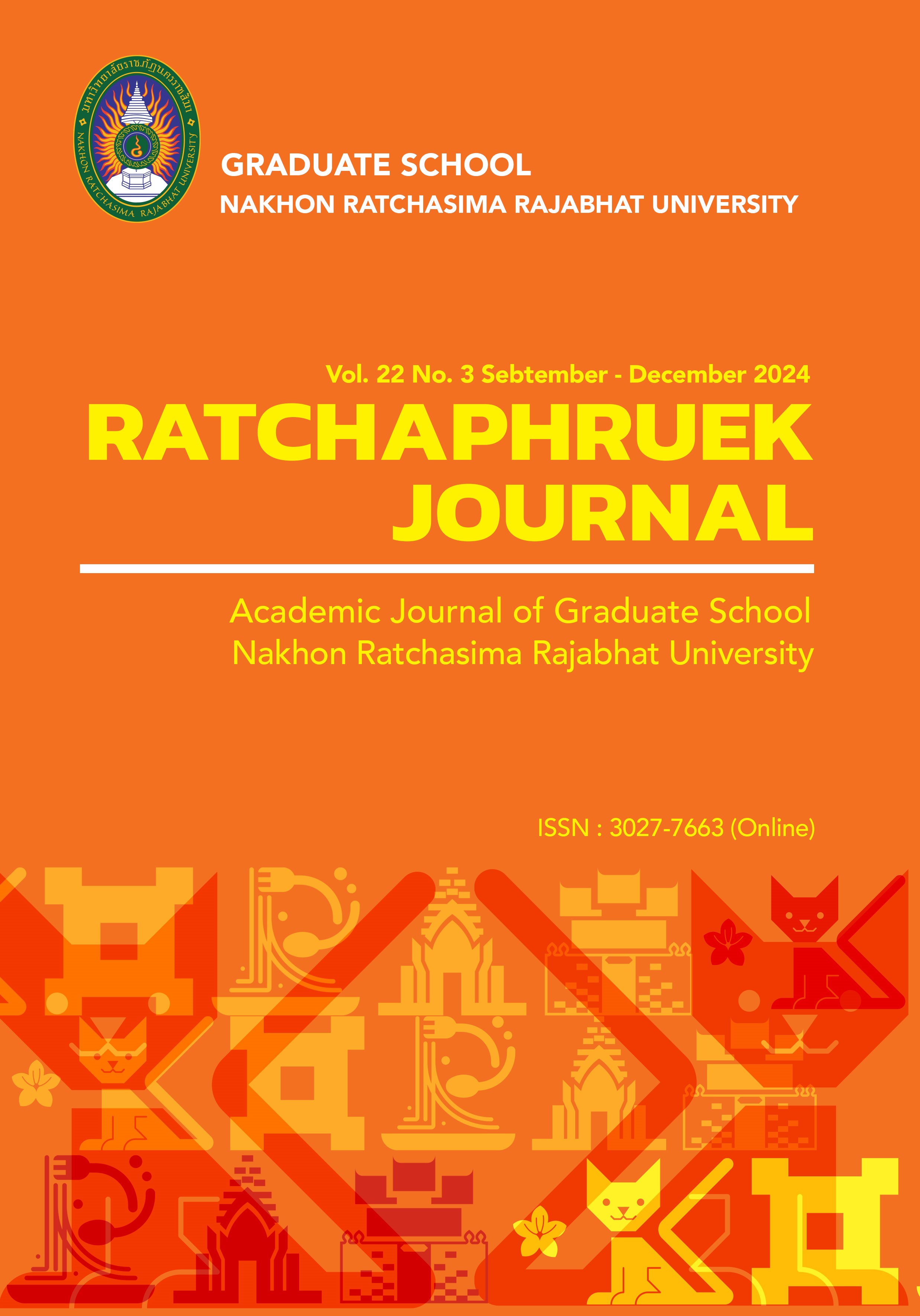A Model for Teamwork Excellence in Schools of Nakhon Ratchasima Province
Main Article Content
Abstract
The objective of this research was to study the components, processes, and success conditions of a teamwork master model for achieving excellence in schools in Nakhon Ratchasima Province. The research employed a qualitative approach and was divided into two phases. Phase 1 focused on studying the components and guidelines for achieving excellence through teamwork in schools, which consisted of two steps: 1) Document analysis to identify the components of effective teamwork in schools, and 2) Confirmation of these components and exchange of knowledge about teamwork towards excellence. Phase 2 involved developing and validating the teamwork model for schools. This phase also comprised two steps: 1) An on-site study of exemplary teamwork practices in three selected schools, and 2) Validation of the teamwork model by presenting it to five qualified experts to confirm its accuracy, appropriateness, and feasibility. Data analysis included content analysis, summarization, and presentation of research findings.
The research findings revealed that: 1) The components of teamwork towards excellence consist of 3 dimensions: personnel, processes, and success conditions. 2) The teamwork process towards excellence includes six steps: context analysis, planning, implementation, support, monitoring, and reporting and evaluation. Personnel development in teamwork involves creating awareness, providing knowledge, enhancing skills and experience, promoting self-development, exchanging knowledge, and job shadowing. Teamwork evaluation encompasses assessing the context readiness, fundamental and supportive factors, teamwork processes, and team performance. 3) Success conditions for achieving excellence in teamwork include 3 dimensions: personnel, process, and work environment. The validated model for teamwork towards excellence was found to be appropriate, accurate, and feasible for implementation.
Article Details

This work is licensed under a Creative Commons Attribution-NonCommercial-NoDerivatives 4.0 International License.
References
กนก พร้อมพิพัฒพร. (2561). แนวทางการพัฒนาการทำงานเป็นทีมของครูโรงเรียน สังกัดสำนักงานเขตพื้นที่การศึกษาประถมศึกษานครราชสีมา เขต 1 (วิทยานิพนธ์มหาบัณฑิต, มหาวิทยาลัย ราชภัฏนครราชสีมา).
ทิศนา แขมณี. (2537). กลุ่มสัมพันธ์เพื่อการทำงานเป็นทีมและการจัดการเรียนการสอน. กรุงเทพฯ: ไทยวัฒนาพานิช.
ธีระ รุญเจริญ. (2553). ความเป็นมืออาชีพในการจัดการศึกษาและบริหารการศึกษายุคปฏิรูปการศึกษา. กรุงเทพฯ: เอ็กซเปอร์เน็ท.
นพวรรณ คงพลิ้ว. (2563). การศึกษาบทบาทการทำงานเป็นทีมของผู้บริหารสถานศึกษา สังกัดสำนักงานเขตพื้นที่การศึกษาประถมศึกษาจันทบุรี (วิทยานิพนธ์มหาบัณฑิต, มหาวิทยาลัยราชภัฏรำไพพรรณี).
พรสุดา ประเสริฐนู. (2654). การพัฒนาแนวทางการสร้างทีมงานสำหรับผู้บริหารสถานศึกษา สังกัดสำนักงานเขตพื้นที่การศึกษาประถมศึกษาชัยภูมิ เขต 2 (วิทยานิพนธ์มหาบัณฑิต, มหาวิทยาลัยมหาสารคาม).
เรืองวิทย์ เกษสุวรรณ. (2556). การสร้างทีมงาน. กรุงเทพฯ: บพิธการพิมพ์.
ลำเทียน เผ้าอาจ. (2559). การทำงานเป็นทีมของข้าราชการครูในโรงเรียนขยายโอกาส อำเภอเมืองตราด สังกัดสำนักงานเขตพื้นที่การศึกษาประถมศึกษาตราด (วิทยานิพนธ์มหาบัณฑิต, มหาวิทยาลัยบูรพา).
วราภรณ์ ตระกูลสฤษดิ์. (2550). การทำงานเป็นทีม. กรุงเทพฯ: ศูนย์ส่งเสริมวิชาการ.
วิเชียร วิทยอุดม. (2547). พฤติกรรมองค์การ. กรุงเทพฯ: ธีระฟิล์ม และไซเท็กซ์.
Brown, A. & Miller, C. (2019). The role of monitoring and evaluation in team performance. Organizational Behavior Review, 22(3), pp. 334-348.
Belbin, R. M. (2010). Team roles at work (2nd ed.). London: Routledge.
Hackman, J. R. (2002). Leading teams: Setting the Stage for great performances. Boston: Harvard Business School Press.
Katzenbach, J. R. & Smith, D. K. (1993). The wisdom of teams: Creating the high-performance organization. Harvard Business Review Press.
Robbins. S. P. (2001). Organizational behavior (9th ed.). New Jersey: Prentice-Hall.
Robbins, S. P. & Judge, T. A. (2013). Organizational behavior (15th ed.). New Jersey: Pearson.
Salas, E. Sims, D. E. & Burke, C. S. (2005). Is there a 'Big Five' in Teamwork?. Small Group Research, 36(5), pp. 555-599.
Smith, J. & Jones, M. (2018). Effective team processes and organizational success. Journal of Management Studies, 55(4), pp. 512-532.
Tannenbaum, S. I., Salas, E. & Cannon-Bowers, J. A. (1996). Promoting team effectiveness. In M. A. West (Ed.), Handbook of Work Group Psychology (pp. 503-529). West Sussex: Wiley.
West, M. A. (2012). Effective teamwork: Practical lessons from organizational research. Chichester: John Wiley & Sons.
Woodcock, M. & Francis, D. (1994). Teambuilding strategy. Hampshire: Gower Publishing.


